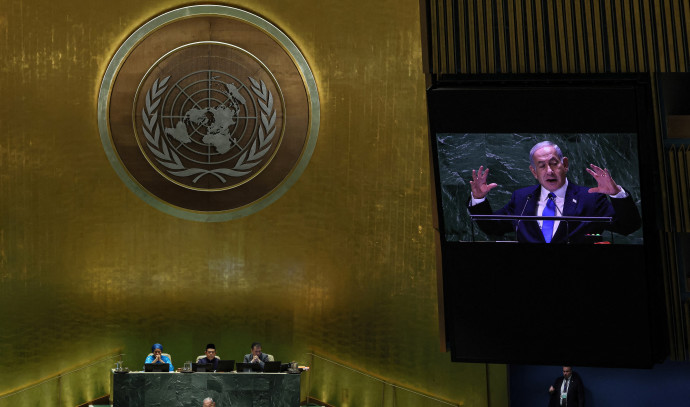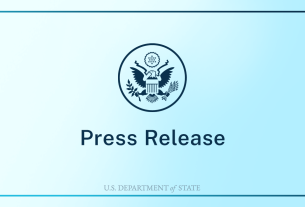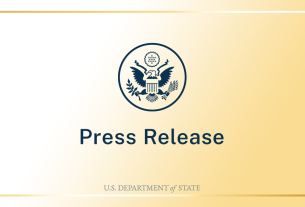Did Prime Minister Benjamin Netanyahu turn artificial intelligence into a nuclear weapon at the United Nations General Assembly when he warned of the “potential eruption of AI-driven wars that could achieve an unimaginable scale?”
While the central focus of Netanyahu’s Friday speech revolved around his vision for a “new Middle East” marked by peaceful relations between Israel and Saudi Arabia, he dedicated the final third of his address to the significance of AI as the “most consequential development of our time.”
The prime minister, while also addressing the issue of Iranian nuclear proliferation, devoted an even more significant portion of his speech to cautioning about the dual nature of AI, emphasizing that it holds the potential for both blessings and curses and the ultimate responsibility for determining its outcome lies in the hands of nations around the globe.
The looming perils of AI
Netanyahu highlighted the looming perils that stand before us: the potential disruption of democracy, the manipulation of minds, the erosion of employment opportunities, the surge in criminal activities, and the vulnerability of the systems that underpin modern life. Moreover, he warned of the even graver threat posed by AI-driven conflicts and autonomous machines capable of controlling humanity rather than the other way around.
“The perils are great, and they are before us,” he said. “The world’s leading nations, however competitive, must address these dangers. We must do so quickly, and we must do so together. We must ensure that the promise of an AI utopia does not turn into an AI dystopia.”
The prime minister’s remarks echoed sentiments akin to those expressed earlier this year by more than 1,000 AI leaders, including Elon Musk, Steve Wozniak, and Bill Gates, in an open letter in which they warned that “mitigating the risk of extinction from AI should be a global priority alongside other societal-scale risks such as pandemics and nuclear war.”
They were also reminiscent of warnings made by Sam Altman, CEO of OpenAI, during his address at Tel Aviv University in June. Altman has advocated for establishing an international regulatory body, similar to organizations overseeing nuclear power, to ensure all nations’ responsible utilization of AI. Altman, too, has emphasized the imperative nature of addressing the “existential threats” posed by AI seriously.
The progress of nuclear fission unfolded remarkably swiftly, and, as Netanyahu pointed out, the advancement of cutting-edge deep learning models and their expanding capabilities is evolving at an equally astonishing rate.
Moreover, there are numerous instances where AI has the potential for evil applications.
How AI can be used for death, destruction
For example, researchers harnessed drug-development AI last year to generate 40,000 potentially deadly molecules, some closely resembling VX, the most potent nerve agent ever developed. This starkly illustrated how AI, typically employed to discover beneficial drugs, can be readily misused.
In their paper, published in the peer-reviewed journal Nature Machine Intelligence and quoted by The Verge, they wrote that using AI, “it is possible to design virtual potential toxic molecules without much in the way of effort, time or computational resources. We can easily erase the thousands of molecules we created, but we cannot delete the knowledge of how to recreate them.”
Nuclear power could play a pivotal role in supplying electricity, supporting desalination plants, and even producing clean-burning hydrogen as an alternative vehicle fuel. As Prime Minister Netanyahu pointed out, AI has the potential to extend human life, advance predictive medicine to prevent diseases well before their onset and alleviate traffic congestion.
However, both nuclear power and AI can also be harnessed as weapons.
In an article by Vox senior reporter Sigal Samuel, she talks about an AI arms race narrative that “has become incredibly popular.”
“If you’d Googled the phrase ‘AI arms race’ before 2016, you’d have gotten fewer than 300 results,” Samuel wrote. “Try it now, and you’ll get about 248,000 hits. Big Tech CEOs and politicians routinely argue that China will soon overtake the US regarding AI advances and that those advances should spur a ‘Sputnik moment’ for Americans.”
She quoted a Microsoft executive who said that the AI race “should be looked at much in the way that the competition with Russia was looked at” during the Cold War and added that “it makes sense that many are worried about China becoming the world’s dominant superpower by going fastest on what is poised to become a truly transformative technology.”
Netanyahu, too, noted that a handful of nations will spearhead the developments of AI, and he counts Israel as already among them.
“Just as Israel’s technological revolution provided the world with breathtaking innovations, I am confident that AI developed by Israel will once again help all humanity,” the prime minister said.
Israel’s AI sector is growing fast, with more than 2,200 companies in Israel using AI for deep tech in a variety of industries, according to a report by the Israel Innovation Authority.
Just last week, the IAI revealed the country’s commitment to invest NIS 30 million in advancing and promoting artificial intelligence applications designed for spoken Hebrew and Arabic.
Recently, there has been a notable surge in Israeli startups across various sectors, such as cybersecurity, fintech, agrotech, and organizational software, venturing into generative AI.
However, Netanyahu’s central message was clear: Like with any weapon, there is a need to handle the future development of artificial intelligence with due caution.
“I call upon world leaders to come together to shape the great changes before us, but to do so in a responsible and ethical way,” the prime minister said.
“Our goal must be to ensure that AI brings more freedom and not less, prevents wars instead of starting them, and ensures that people live longer, healthier, more productive and peaceful lives,” Netanyahu continued. “And may we avoid the perils of AI by combining the forces of human and machine intelligence to usher in a brilliant future for our world, in our time, and for all time.”



